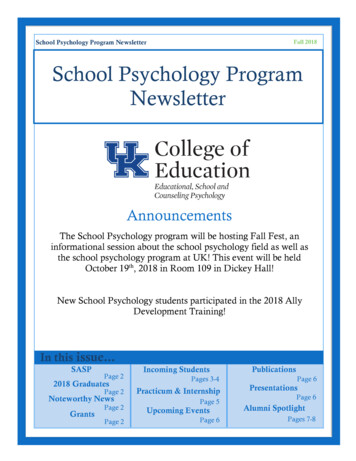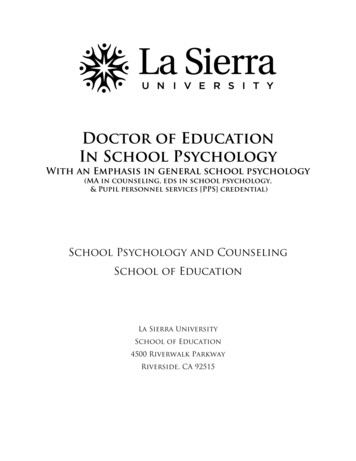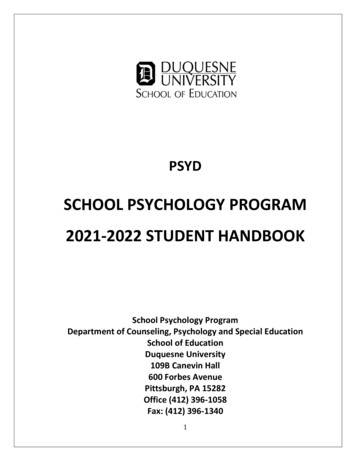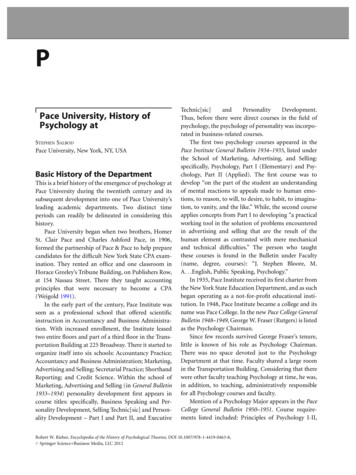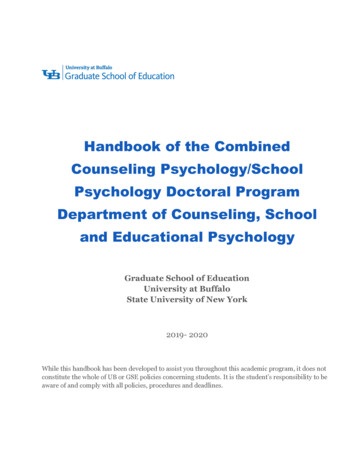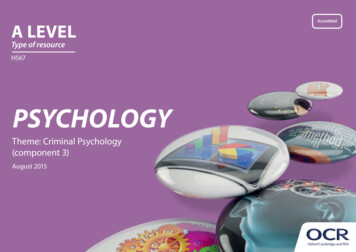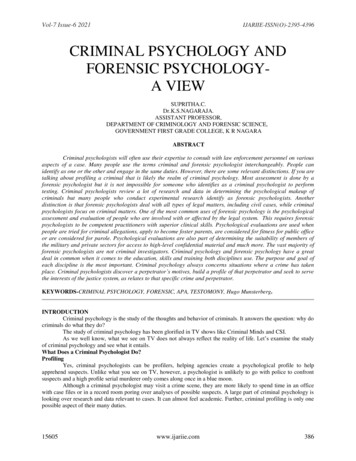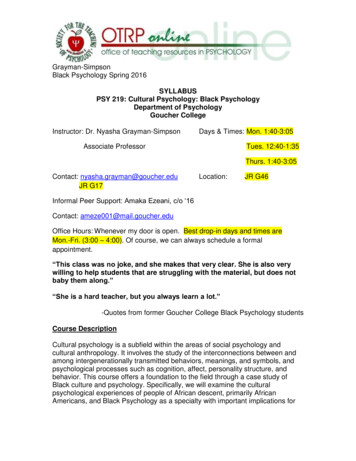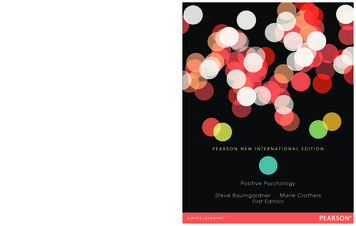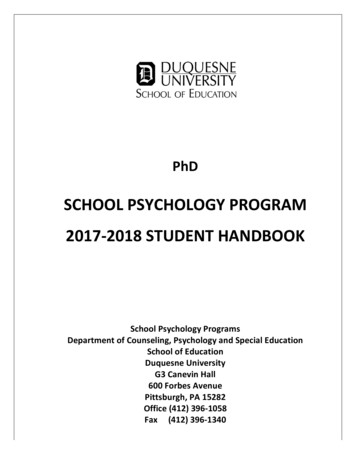
Transcription
PhDSCHOOL PSYCHOLOGY PROGRAM2017-2018 STUDENT HANDBOOKSchool Psychology ProgramsDepartment of Counseling, Psychology and Special EducationSchool of EducationDuquesne UniversityG3 Canevin Hall600 Forbes AvenuePittsburgh, PA 15282Office (412) 396-1058Fax (412) 396-1340
Table of ContentsPHD SCHOOL PSYCHOLOGY PROGRAM OVERVIEWTenets of the PhD School Psychology ProgramPhD School Psychology Mission StatementLocation and Administration of the PhD ProgramProgram FacultyPhD School Psychology Program Aims and CompetenciesPhD School Psychology Program Course of Study OverviewPhD School Psychology Program Course SequenceDoctoral Preliminary ExaminationDoctoral Oral Comprehensive ExaminationProcedure for Completion of Exam PaperHow to Study for Doctoral Oral Comprehensive ExamsPractica and Internship OverviewPracticum SequenceFirst Year PracticumSecond Year PracticumAdvanced Doctoral PracticumInternshipInternship RequirementsInternship Site SupervisionUniversity Supervision of the InternshipInternship Permanent ProductsEvaluation of InternsDissertation ProposalDissertation RequirementsSchool Psychology Program ePortfolioComprehensive Student Requirement ListFaculty-Student 8192121GENERAL INFORMATION FOR DUQUESNE STUDENTSDuquesne University Student HandbookDORIMultiPassUniversity Weather and Emergency Closings2121222222PHD PROGRAM POLICY AND PROCEDURESSchool Psychology WebsiteSchool Psychology ListservPhD School Psychology Program Admissions ProceduresAdmissions of Practitioners Returning for a PhD in School PsychologyAcademic Standing-Credit Transfer PolicyChange of Degree Programs222223232525262
Statute of LimitationsTemporary Approved Leave of Absence from Graduate StudyResidency RequirementsIncomplete GradesContinuous Enrollment PoliciesEffective Date and ReportingWithdrawn Status and ReadmissionInactive Status and ReadmissionIndependent StudyStudent OrientationAnnual Clearances RequiredAdvisementChange of AdvisorAnnual Student Self EvaluationOngoing Evaluation of Student ProgressStudent Remediation ProceduresRetention StandardsDue Process: General GuidelinesFinal Grade Appeal PolicyNew Student Test Kit FeeStudent Mail FoldersProgram Student FilesTest KitsPracticum and Internship LogsSchool Psychology Program Graduate Assistant Evaluation Procedures and TimelinesConference PostersPhD Graduation PolicyCertificationStudent Affiliates in School Psychology 36373737373838STUDENT RESOURCESOffice of Freshman Development and Special Student ServicesFinancial Aid, Health Insurance, and Student StatusGumberg Library and Curriculum CenterGraduate AssistantshipsOther AssistantshipsGrants, Scholarships, and FellowshipsProfessional Organization MembershipsContinuing Education Opportunities393940404041414142PROGRAM FORMS AND DOCUMENTS423
PHD SCHOOL PSYCHOLOGY PROGRAM OVERVIEWThe 111-hour PhD Program is accredited by the American Psychological Association (APA), as wellas the National Association of School Psychologists (NASP), and includes coursework, practica,dissertation, and internship. Completion of this Program leads to a MSEd in Child Psychology, aPhD, Certification in School Psychology by the Pennsylvania Department of Education, and preparesgraduates to apply for licensure by a State Board of Psychology. In addition to practicing psychologyin schools, child clinics, and child service agencies, doctoral-level school psychologists can becomelicensed for the independent practice of psychology and work as a university professor. PhDgraduates often seek employment in settings where research skills are required. Upon completingthe PhD Program and successfully passing the Praxis School Psychology Exam, graduates may becredentialed as Nationally Certified School Psychologists (NCSP).APA’s Commission on Accreditation can be reached at 750 First Street NE, Washington, DC 200024242; telephone: 202.336.5979.Tenets of the PhD School Psychology ProgramAll children can benefit from the educational environment. Attainment of this goal requires themeasurement of effective instructional and socialization practices that are informed by researchand theory. School psychologists implement and advocate for these exemplary practices throughdata-based decision making, collaboration, consultation, and demonstrating accountability to allstakeholders in terms of student achievement of cognitive and academic goals and healthy socialemotional development. The purpose of these exercises is to organize schools in ways thatpromote learning and mental health, prevent problems, and encourage a sense of community forall students from varied racial, cultural, ethnic, experiential, and linguistic backgrounds.To these ends, the Duquesne School Psychology PhD Program is committed to providing studentswith the necessary skills to think critically and become change agents by contributing newknowledge to the literature, become moral and ethical practitioners, and become lifelong learnerswho can work as colleagues within the educational community. The School Psychology Programfaculty provides these necessary skills through a challenging and stimulating curriculum, mentoringexperiences through research projects, practical experiences with skilled and ethical practitioners,and providing ongoing service and support to students after graduation.The Duquesne University School Psychology Program is guided by the resolutions and positionstatements of NASP and APA. The Program is committed to the belief that all students have theright to a safe supportive environment. PhD students will be exposed and required to work withstudents of diverse backgrounds(e.g. different family compositions, ethnic and cultural, ES, amongother things), sexual orientation, and religious beliefs. For more information please visit:1. American Psychological Association & National Association of School Psychologists. (2015).Resolution on gender and sexual orientation diversity in children and adolescents in schools.Retrieved fromhttp://www.nasponline.org/about nasp/resolution/gender sexual orientation diversity.pdf4
2. National Association of School Psychologists. (2017). Resolution Affirming NASP Commitment toHigh Quality Public Education for All Children and Youth. Retrieved professional-positions/resolutionsPhD School Psychology Program Mission StatementThe Duquesne University School Psychology Program, guided by the belief that all children canlearn, is dedicated to providing both breadth and depth of professional training in a theoreticallyintegrated, research-based learning environment. The Program prepares ethical practitioners,scientists and scholars who are life-long learners committed to enhancing the well-being of youth,their families, and the systems that serve them. The Program achieves this by engaging in scholarlyactivities that advance the field of school psychology, maintaining a modern curriculum thatemploys aspects of multiculturalism and diversity, examining emerging trends in the profession,conducting continuous outcomes assessment for Program improvement, and providing support toour graduates.Location and Administration of the PhD ProgramDuquesne University first opened its doors as the Pittsburgh Catholic College of the Holy Ghost inOctober 1878 with an enrollment of 40 students and a faculty of seven. Today Duquesne Universityis a progressive educational facility, which has more than tripled from its early 12.5 acres to itspresent 43-acre campus. Current enrollment is more than 10,000 students in 9 schools of study.The Duquesne University School Psychology Program is located within the Department ofCounseling, Psychology and Special Education, in the School of Education. The School of Educationis one of eleven schools of study at Duquesne, and the Department of Counseling, Psychology andSpecial Education is one of three departments in the School of Education. The Dean of the School ofEducation is Dr. Cindy Walker. The Chair of the Department of Counseling, Psychology and SpecialEducation is Dr. Tammy L. Hughes. The School of Education offers the Bachelor of Science degree,Master of Science in Education degree, Certificate of Advanced Graduate Study, the Doctor ofEducation degree, and the Doctor of Philosophy degree in a variety of fields of study. The School ofEducation is accredited by NCATE.The School of Education is accredited by the Pennsylvania Department of Education and the MiddleStates Association of Colleges and Schools. The School Psychology Program, which began in 1969,offers a 30-hour Master’s Degree in Child Psychology (MSEd), a 91 hour Doctor of Psychology(PsyD) in School Psychology, and an 111 hour Doctor of Philosophy (PhD) in School Psychology. TheCertificate of Advanced Graduate Study (CAGS) in School Psychology degree program is in theprocessing closing.Program FacultyThe following are University-designated School Psychology faculty members:Laura M. Crothers, DEd5
Professor of School Psychologycrothersl@duq.edu11TUU11TTammy L. Hughes, PhDProfessor of School PsychologyChairperson, Department of Counseling, Psychology, and Special Educationhughest@duq.eduUErika Martin, PsyDVisiting Assistant Professor of School PsychologyMartine8@duq.eduElizabeth McCallum, PhDAssociate Professor of School Psychologymccallume@duq.edu11TUU11TKara McGoey, PhDAssociate Professor of School Psychologymcgoeyk@duq.edu11TUU11TJeffrey A. Miller, PhDProfessor of School PsychologyAssociate Provost of Administrationmillerjeff@duq.edu11TUU11TYadira Sánchez, PhDClinical Assistant ProfessorSánchezy@duq.eduAra J. Schmitt, PhD (Program Director)Associate Professor of School Psychologyschmitta2106@duq.eduUCourses with a subject code of “GPSY” will be taught by the faculty members above. Courses takenwithin the PhD degree sequence that do not carry this label will be taught by other School ofEducation and University faculty members.PhD School Psychology Program Aims and CompetenciesThe aims and competencies of the PhD School Psychology Program are tightly linked to APA’sStandards of Accreditation, NASP’s graduate education training standards, the Program’s trainingmodel, and current professional issues of the field. Specific PhD Program aims and competenciesinclude the following:Aim 1: Train health service psychologists (HSPs) to deliver school psychological services.6
Ethical and Legal Standards Competency: Students must be knowledgeable of and act inaccordance with relevant professional standards, and legal and ethical guidelines.Individual and Cultural Diversity Competency: Students must demonstrate knowledge, awareness,sensitivity, and skills when working with diverse individuals and communities.Professional Values, Attitudes, and Behaviors Competency: Students must behave in ways thatreflect the values and attitudes of health service psychology.Communication and Interpersonal Skills Competency: Student must maintain effective professionalrelationships marked by effective communication skills.Assessment Competency: Students must demonstrate competence in conducting evidence-basedassessments consistent with the scope of Health Service Psychology.Intervention Competency: Students must demonstrate competence in evidence-based interventionsconsistent with the scope of Health Service Psychology.Supervision Competency: Students must demonstrate knowledge of supervision models andpractices.Consultation and interprofessional/interdisciplinary Skills Competency: Students must demonstrateknowledge of consultation models and practices, and respect for the roles and perspectives of otherprofessions.Aim 2: Train leaders in the field who promote the science of psychology.Research Competency: Students must demonstrate knowledge, skills, and competence sufficient tocontribute and disseminate new knowledge to the scientific evidence base.Research Competency: Students must critically evaluate and use existing knowledge within thepractice of health service psychology.PhD School Psychology Program Course of Study OverviewIn order to achieve the competencies, goals, and objectives above, the faculty is committed to alearning environment which stresses an integrated, well- organized, and specific curriculum withclear expectations. Each faculty member has a strong commitment to formal and informal studentfaculty interactions that further mentor the student's educational progress, professionaldevelopment and identification with the field. The climate of the Program is one that fostershealthy scholarly debate and discourse, critical questioning of current issues and trends in the fieldand respect for diversity in theory and practice, thus creating a stimulating and enrichingeducational environment. Emphasis is placed on the preparation of competent practitioners whoare also skilled at the consumption and integration of scientific knowledge, theory, and practice.Consistent with the scientist-practitioner model of training, students are involved in a systematicsequence of didactic courses, applied courses, field experiences, and research requirements. Thesequential plan of study is designed to prepare students for the professional practice of schoolpsychology by developing foundational knowledge, skills, and professional dispositions and7
behavior required for independent practice and the ability to conduct original research to addressunanswered questions within the scientific literature. A brief, narrative overview of the PhD courseof study follows.During the first year of the Program, students are enrolled in several foundation courses designedto provide knowledge in the areas of child development, learning theories, psychologicalmeasurement, scientific methods and data analysis, and professional issues and development.Students also engage in coursework, fieldwork and practica dealing with individual differences,design and implementation of interventions, and intellectual, behavior, and academic assessment.PhD students are enrolled in Directed Research, a course designed to familiarize students with theresearch process, promote active engagement in research projects through faculty-studentcollaboration, and provide research mentoring prior to completing a dissertation.Upon completing the first 30 credits in the PhD Program, students will be awarded a Master’s ofScience in Education (MSEd) degree in Child Psychology. It is the student’s responsibility to obtain,complete, and submit the degree application form to obtain the MSEd in Child Psychology.The second year of the Program builds on the student's knowledge base in psychology andeducation by providing coursework in consultation, psychotherapy, personality assessment,psychopathology, and neuropsychology. In addition, students are involved in practicum throughoutthe second year of study. Students begin to research dissertation topics in the second year andmany students start forming his or her dissertation committee. The research skills of studentscontinue to be developed through the Directed Research sequence.The third and fourth years of the Program focus upon the cognitive, social, biological anddevelopmental aspects of psychology, the professional practice of school psychology, theprofessional responsibilities of university teaching, and research methodology and analysis. Duringthe third year, students begin to articulate his or her dissertation work through course seminarsand establish a formal dissertation committee. Students begin advanced doctoral practicum whichalso challenges students to recognize how clinical practice can inform scholarly pursuits. In additionto applied practice settings, PhD students may seek a research-oriented practicum experience. Thedissertation seminar sequence prepares a student to propose a dissertation as early as the summerof the third year. Students are strongly encouraged to defend the doctoral dissertation during thefourth year of study. An elective based on student career goals is allowed in either the third orfourth year.The fifth year of the student's Program involves the culminating experience of a supervisedinternship in school psychology. Typically, internship is completed on a full-time basis, although atwo year half-time internship is permissible.PhD School Psychology Program Course SequenceFall Year 1CreditsGPSY 505Role and Function of School Psychology3GPSY 512Psychological Testing38
GPSY 619Child and Adolescent Development3GPSY 692Individual Testing3GPSY 810Directed Research1GPSY 623Behavior Interventions3GPSY 625Academic Interventions3GREV 610Statistics II3GPSY 511Psychology of Learning3GPSY 810Directed Research1PSYCH 535History and Systems of Psychology3GCNE 572Child and Adolescent Counseling3GPSY 680Consultation and Program Evaluation3GPSY 618Personality Assessment for Intervention3GPSY 691Psychotherapy with Children and Adolescents3GPSY 691LPsychotherapy and Consultation Practicum1GPSY 810Directed Research1GPSY 695Child Neuropsychology3GPSY 690Child and Adolescent Psychopathology3GREV 701Research Methods and Design3GPSY 693LIntegrated Practicum1GPSY 810Directed Research1Standards and Ethics in School Psychology3GPSY 705Single Subject Methods for School Psychologists3GPSY 614Organizational Consultation and Supervision3GREV 611Educational Statistics III3GPSY 813Professional Seminar: Dissertation Research1GPSY 812LAdvanced Doctoral Practicum I1GPSY 890Advanced Doctoral Practicum Seminar I1GPSY 810Directed Research1Biological Basis of Behavior3Spring Year 1Summer Year 1Fall Year 2Spring Year 2Summer Year 2GPSY 815Fall Year 3Spring Year 3GPSY 8119
GREV 612Educational Statistics IV (offered every other year), ora research elective in place of Ed. Stats. IV3GPSY 813Professional Seminar: Dissertation Research1GPSY 812LAdvanced Doctoral Practicum II1GPSY 891Advanced Doctoral Practicum Seminar II1GPSY 810Directed Research1Helping English Language Learners in Mainstream Classes3CESD 815Instructional Methods Seminar and Practicum3ElectiveOption – GPSY 808: Early Childhood: Assessment and Intervention3GPSY 810Directed Research1CESD 805Counselor Education and Supervision Leadership in a Diverse Society3GPSY 612Social Psychology3GREV 612Educational Statistics IV (offered every other year), ora research elective to take the place of Ed. Stats. IV3ElectiveOption – GPSY 804: Child Violence in Schools3GPSY 810Directed Research1GPSY 903Internship Seminar I3GPSY 901Internship I1GPSY 906Dissertation3GPSY 904Internship Seminar II3GPSY 902Internship II1GPSY 906Dissertation3Summer Year 3GESL 501Fall Year 4Spring Year 4Fall Year 5Spring Year 5TOTAL DEGREE CREDITS111Note 1. Students must select one (3 credit hour) elective among GPSY 808: Early ChildhoodAssessment and Intervention (offered each fall), GPSY 804: Child Violence in Schools (offered eachspring), and an elective approved by the student’s advisor. The elective can be taken any time inthe third and fourth years of study. A PhD student’s course sequence must total 111 credits.Note 2: Dissertation credits do not need to be taken in the suggested semesters above. Studentsmust register for a total of 6 dissertation credits (GPSY 906) to be eligible for graduation.10
Note 3: GPSY 509 (Independent Study), GPSY 812L (Doctoral Practicum), and GPSY 906 (DoctoralDissertation) have separate sections for individual faculty members. Be sure to register for theproper faculty member.Doctoral Preliminary ExaminationStudents must successfully complete a Doctoral Preliminary Examination (ComprehensiveExamination) after the second year of coursework. The Program has adopted the Praxis SeriesSchool Psychology test administered by ETS as the comprehensive examination. More informationabout this test, as well as registration procedures, can be found at:http://www.ets.org/praxis/nasp/requirements . The Program has adopted a passing score of 150 asthis score is required by NASP to become a Nationally Certified School Psychologist (NCSP). Scoresshould be sent to Duquesne University and NASP at the time of testing. Students must pass theSchool Psychology Praxis prior to continuing to the third year of coursework.11TUU11TDoctoral Oral Comprehensive ExaminationDuring Dissertation Seminar I (fall semester of the third year of study), each PhD student will writea research review paper that aligns with one’s dissertation research interests. This APA publicationstyle compliant paper is due to the Program office at the end of the fall semester of the third yearand is intended to be the springboard for Chapter II of the student’s dissertation. Therefore, eachstudent is strongly encouraged to work directly with his or her dissertation chair through theprocess of writing the review paper. The completed review paper should meet the standards of theresearch paper grading rubric (Current Students tab of Program Website) and must include thefollowing regardless of topic:1. Describe the general context. How does the area of study fit into broader issues, and what isthe significance? The student should use a review of literature as evidence.2. Describe the particular area in detail. Included in this section the student should state theneed for research in the area. This should include examination of the scientific merit of thecited literature.3. Pose specific gaps in the research literature and future research recommendations. Youshould not provide participants, research design, or a data analysis section.UUAfter the paper is completed, each student is required to schedule a doctoral oral comprehensiveexamination no later than the third week of the spring semester in the third year of study. The oralexam must be completed prior to dissertation proposal and internship. The oral examination will beconducted a committee of two faculty members determined by (faculty) group consensus at aProgram faculty meeting. Students do not select committee members. One committee member istypically the student’s dissertation chair and, to the extent possible, the second member hasexpertise in the general topic area. This oral exam committee does not serve as the dissertationcommittee. The oral exam committee is a temporary committee comprised solely of SchoolPsychology faculty members who evaluate the written review paper and the conduct the doctoraloral comprehensive examination.U11U
Prior to conducting the oral examination, if the examination committee determines that thesubmitted review paper is inadequate, the student will be required to correct and resubmit thepaper to the examination committee. A new deadline for the review paper will be determined bythe committee and the oral examination will be administered thereafter.Questions for the two-hour oral examination will be formed by the examination committee afterreviewing the paper. Oral comprehensive exam questions may involve Program coursework andpracticum experiences related to the topic area, in addition to analysis of the review paper. Theoral examination is rated by each member of the examination committee based on the DoctoralExamination Scoring Rubric (Current Students tab of Program Website). Should a student fail thedoctoral comprehensive examination, the student will retake the exam on a date determined to bereasonable by the committee. In the case of repeated failure of the doctoral oral comprehensiveexamination, the examination committee will recommend to the Program faculty a plan regardingthe student’s status in the Program, consistent with student remediation procedures described inthis handbook.Procedure for Completion of Exam Paper1. Student meets with a prospective dissertation faculty advisor in the spring of the 2 nd year toconfirm a topic area.PP2. Students enroll in Professional Seminar: Dissertation Research in fall year 3to begin developing the written portion of the doctoral comprehensive exam.3. Students receive guidance in this course throughout the fall semester (withpossible recommendation for writing tutoring or writing center assistance).4. The faculty course instructor reviews each student’s paper near the end of the fallsemester to determine viability. If a student’s paper is judged to be weak, the student isreferred to his or her projected dissertation advisor as early as possible formentoring/editing.5. Students have until the end of the fall semester work with his or her projected dissertationadvisor and the seminar instructor to improve the paper.6. If a student’s paper does not appear satisfactory at the end of the fall semester, the studentwill meet with his or her exam committee for the development of an action plan to improvethe quality of the paper. Concerns at this point in the process may trigger a review of thestudent’s ability to successfully complete a dissertation and status in the Program.How to Study for Doctoral Oral Comprehensive ExamsThe examination will cover the three main topics discussed above. You should be able to answerquestions about the explicit content of the review paper, the content of research literature cited inthe review paper, foundational theory derived from coursework, and practical implications inferredfrom practica experiences. Therefore, study the core psychology courses (Development, Learning,12
Personality, etc.) that you have taken. Be able to use what you learned in those courses to explainyour review paper. Study each article that you cite in the review paper. Here is where statistics andresearch comes in. Can you discuss the merit, based on the research design, of the articles youcited? The review paper does not include a research plan, but the examinee should demonstrateunderstanding of statistics and research methodology through the analysis of the extant literature.Finally, prepare an argument for the significance of the area of research.Practica and Internship OverviewAs a competency based Program, coursework and field experiences are carefully sequenced so thattheoretical knowledge, skill acquisition, and the opportunity to enhance these skills are fullyintegrated. In addition to coursework, students are expected to engage in field experiences duringeach semester of residence consistent with appropriate ethical, professional and legal standards.Please note that travel to a local practicum site is necessary. In order of completion, the field-worksequence includes:1. First Year Practicuma. Role and Function of School Psychologists field-experience (fall)b. Academic/Behavior Interventions field-experience (spring)2. Second Year Practicuma. Psychotherapy and Consultation Practicum (fall)b. Integrated Practicum (spring)3. Advanced Doctoral Practicum (fall and spring semesters of the third year)4. Continued advanced practicum is encouraged in the fourth year of study to increaseinternship competitiveness and develop additional expertise.5. InternshipAll aspects of practicum and internship are supervised by university faculty and by appropriatelycredentialed field-based site supervisors. All site supervisors are during the first two years arecertified school psychologists as the experiences occur in schools. All site supervisors during thethird year are certified school psychologists and/or licensed psychologists, consistent with therequirements for practice at the specific field-site. Students must log all hours incurred duringpracticum and internship.Student competence given stage of training is required for each field-experience before advancingto the next field experience and then to internship. Competence will be determined by facultyevaluation of practicum performance and field-based supervisor ratings of performance. Theassociated faculty member will award a “Pass” or “Fail” designation for Psychotherapy andConsultation Practicum, Integrated Practicum, Advanced Doctoral Practicum, and Internship. Allpractica must be completed prior to being released for internship.Additionally, students complete an Evaluation of Site form (see Current Students tab of ProgramWebsite) following each practicum experience and these are reviewed and discussed by theProgram faculty to assist in future student placement and Program planning.13
Please note that Child Abuse, Criminal Record, and FBI Clearances, in addition to TB testing, need tobe renewed on an annual basis as many sites are now requesting up-to-date clearances. If theinternship is completed out of PA, it is permissible to submit that state’s clearance forms. Information on obtaining clearances may be found student-academic-services/clearances .11TUU11TThere is also liability insurance provided by the University to cover students during practicum andinternship. If your site requires this form, it is available in the Program Office.Practicum SequencePhD students are required to complete a minimum of 750 total hours of practicum prior tointernship. If a student chooses to pursue an internship in a non-school setting, 600 practicumhours must be from a school setting. Program students are placed at practicum field sites based onstudent learning needs and, to the extent possible, career goals of the student. All practicumactivities must be logged using MyPsychTrack.com. Faculty will ask for hard-copies of logs to ensurestudents are meeting course and practicum requirements. It is vital that students maintain accuratelogs and complete them in a timely manner. The Program will require each student to submit a .pdf“Summary Report” from MyPsychTrack at the completion of advanced doctoral practicum activitiesand prior to being formally approved for internship.First Year PracticumDuring the first semester of the Program, students complete several foundation courses, as well asthe first professional psychology course, GPSY 505: Role and Function of School Psychologists. Asstated in the course description, the course is designed to “introduce prospective schoolpsychology students to the field of school psychology.” Th
The School Psychology Program, which began in 1969, offers a 30-hour Master's Degree in Child Psychology (MSEd), a 91 hour Doctor of Psychology (PsyD) in School Psychology, and an 111 hour Doctor of Philosophy (PhD) in School Psychology. The Certificate of Advanced Graduate Study (CAGS) in School Psychology degree program is in the
